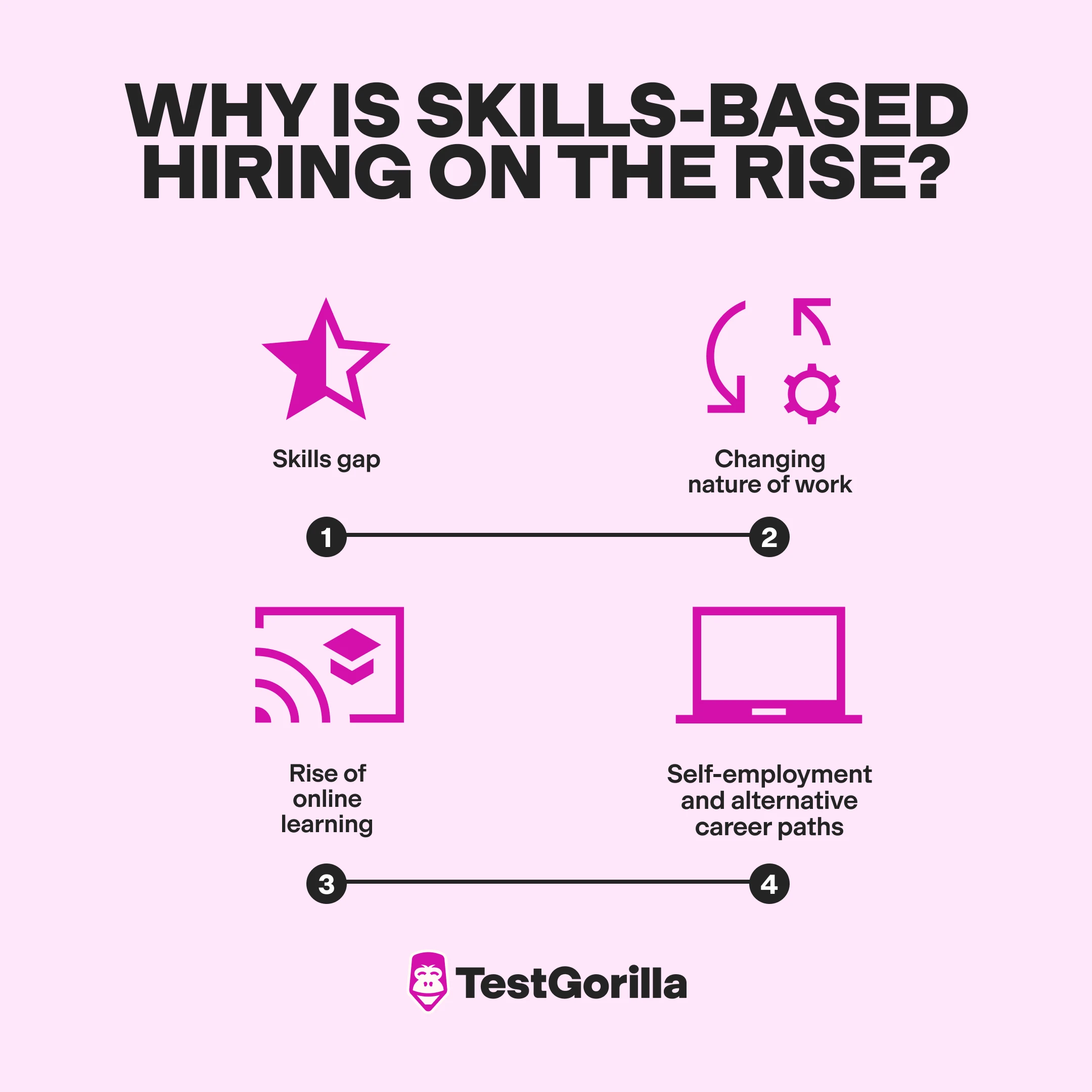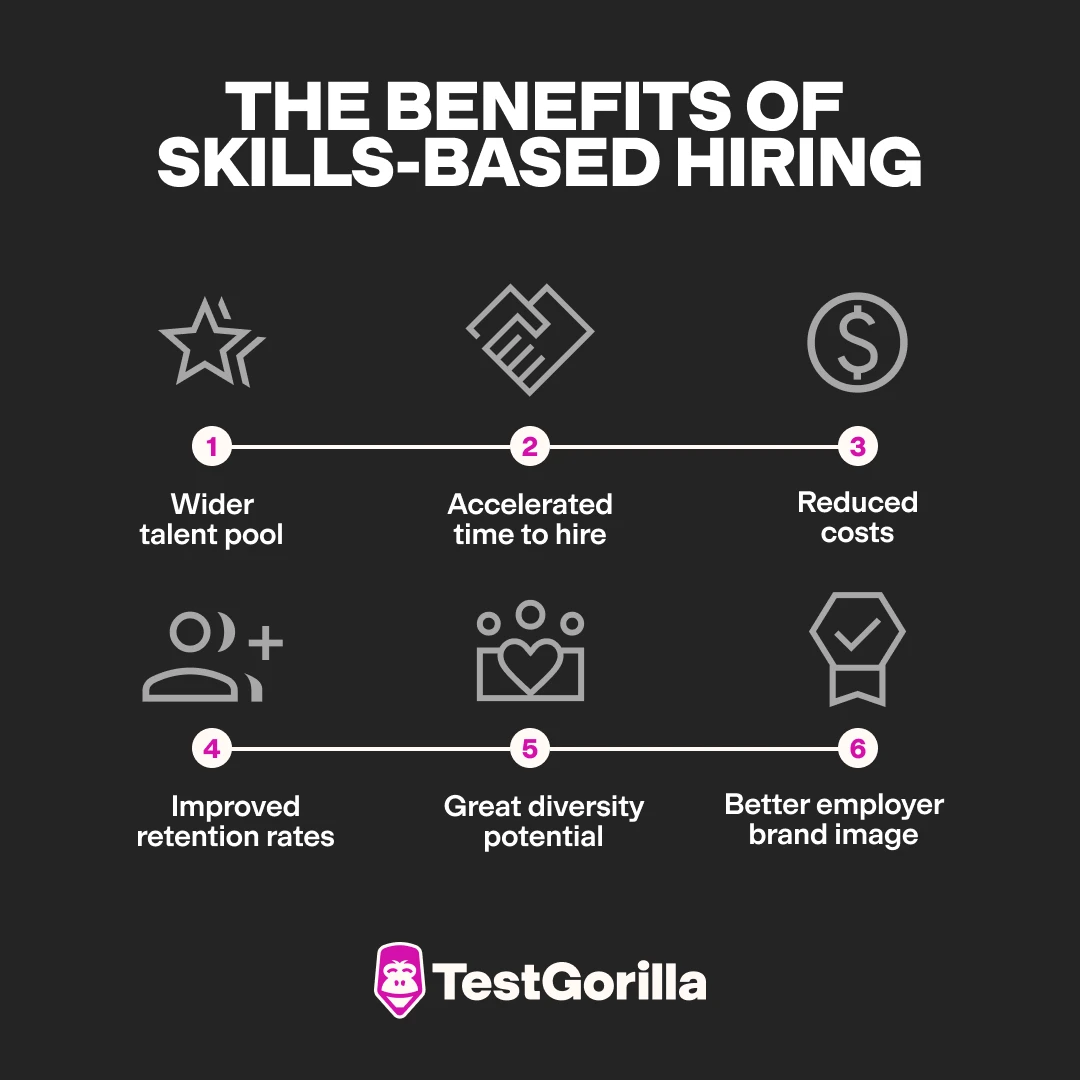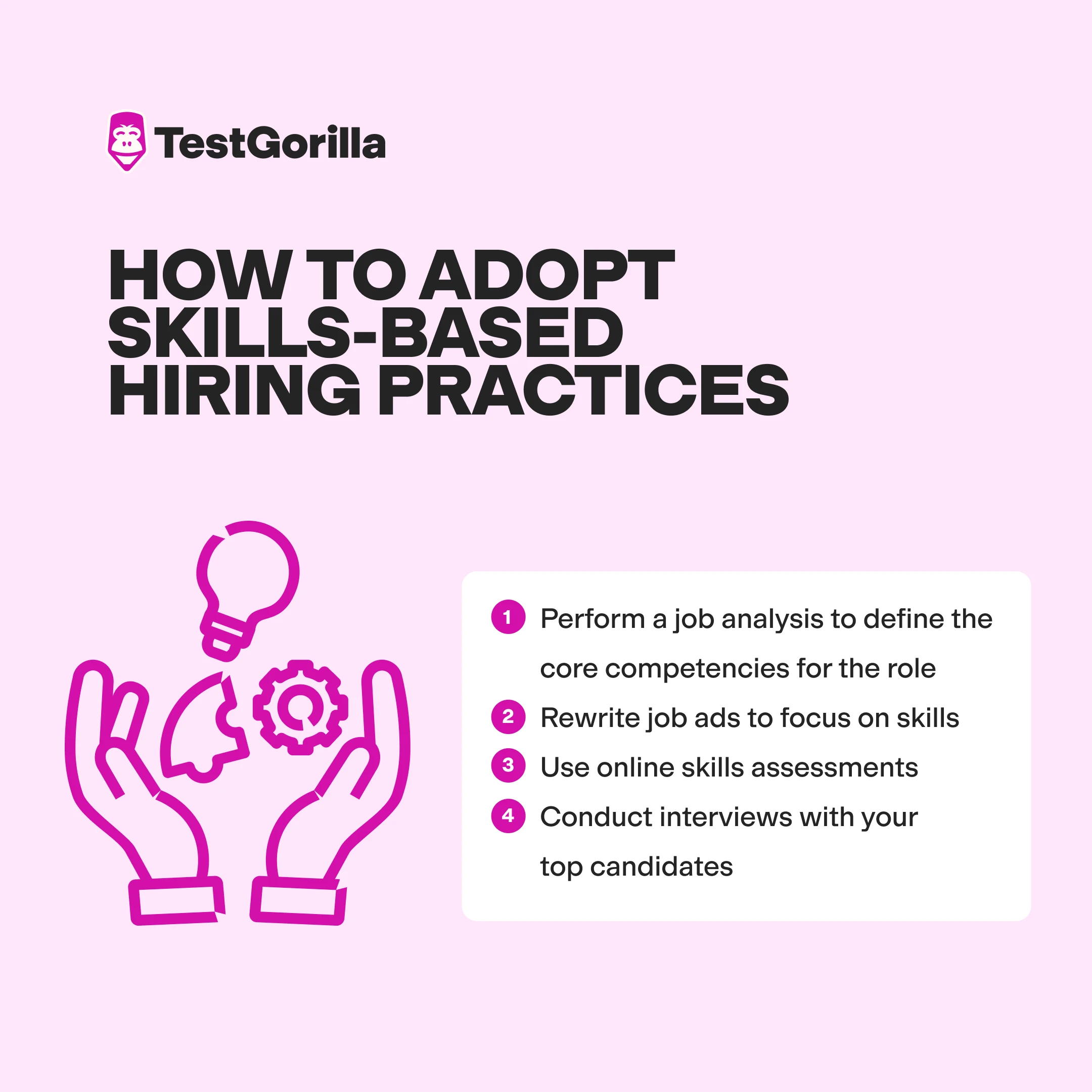Skills-based hiring is on the rise. What does this mean for recruitment?
In case you didn't know yet, skills-based hiring is on the rise.
In this article, we’ll use data we collected from 3,000 employers and employees to discuss the rise of skills-based hiring, describe what it means for recruitment, and explain how a skills-based approach can help you make the most of your hiring budget.
Table of contents
4 reasons why skills-based hiring is on the rise
73% of employers are using skills-based hiring.
There are 4 key reasons why skills-based hiring now appeals to the majority of employers.
1. The skills gap
Skills gaps are among the most pressing problems that businesses face today. According to a survey by McKinsey & Company, nearly 9 out of 10 executives say their organizations are either already experiencing skills gaps or expect to within the next five years.
43% of employers say they struggle to determine an applicant’s skills from their resume, and 51% struggle to determine whether the resumes of their applicants are accurate.
It’s becoming increasingly difficult for companies to source and hire employees with the necessary skills and qualifications, especially in fields that experience rapid technological disruption and growth.
According to the same survey, the domains with the greatest need to address talent gaps are data analytics, IT, executive management, and HR.
To fill skills gaps, companies need to adapt their approach to the challenges of the current job market. This is leading to increasing adoption of skills-based hiring practices.
2. The changing nature of work
The way we work is transforming. Many jobs that didn’t exist a few years ago are now in high demand. This means that the skills employers are looking for are also changing at a rapid pace.
We don’t yet have degree programs for the jobs of tomorrow, and by the time we do, the jobs will have changed. The rise of AI is also leading to the rapid development of new, AI-related skills. Traditional hiring practices simply can't keep up.
3. The rise of online learning
The proliferation of online learning platforms has made it easier than ever for people to learn new skills. This means that candidates who might not have had the opportunity to get a traditional college education can still acquire the skills they need for the job.
4. Self-employment and alternative career paths
Many individuals no longer follow the standard career path of obtaining a degree, finding a position that they stay in for many years, changing jobs once or twice, and then retiring.
Millennials, for example, are much more likely to change jobs. According to a Gallup survey, 21% of millennials say they have changed jobs within the past year, which is more than three times higher than respondents in other age groups.
Though job changes don’t necessarily imply career changes, this shows that millennials are much more flexible and likely to acquire new skills as they go. Self-employed individuals also often upgrade their skills on their own or pursue online certifications to gain new skills.
What does the rise of skills-based hiring mean for recruitment?
Now that we understand why skills-based hiring is on the rise, the question is: What impact will this hiring trend have? Below are three shifts that are occurring in recruitment due to the rise of skills-based hiring.
1. The end of degree requirements
Although some employers continue to require a college degree even for entry-level positions, many have noticed that degree-based hiring is becoming obsolete.
According to The Burning Glass Institute, employers already reset the degree requirements for 47% of middle-skill and 31% of high-skill roles between 2017 and 2019. The rise of skills-based hiring, along with initiatives to 'tear the paper ceiling,' are accelerating this trend even more.
The Paper Ceiling: (n) the invisible barrier that comes at every turn for workers without a bachelor’s degree. See also: no alumni network, biased algorithms, degree screens, stereotypes, and misperceptions.
Requesting a college degree for all, or nearly all, positions might lead to the following:
Narrower talent pool: If your requirements for a role are too specific, you might miss out on great candidates who don’t quite fit the bill but have the right experience or could be trained for the role.
Larger skills gaps: If your company is only considering candidates with a college degree, you might be making your skills gap larger.
Less diverse workforce: College degrees are becoming increasingly expensive in the US; by requiring one, you might be unwittingly excluding candidates from lower-income backgrounds.
Increased chances of mis-hire: A degree does not tell you which candidates have the skills needed to do the role.
So it's unsurprising that so many employers - including the federal government - are moving away from them.
2. The end of resumes
The rise of skills-based hiring means that talent assessments are likely to replace resumes as the go-to top-of-the-funnel hiring tool.
We set out to discover more about the rise of skills-based hiring and the impact it will have on resume usage in The State of Skills-Based Hiring 2023. We discovered that over 70% of the employers we surveyed agree that skills-based hiring is a more effective hiring tool than resumes. Additionally:
34% of employers say they receive too many resumes to read
43% of employers say they find it difficult to rank candidates using resumes
43% of employers say they struggle to determine an applicant’s skills from their resume
51% of employers say they struggle to determine whether the resumes of their applicants are accurate
Check out more resume statistics, or read The State of Skills-Based Hiring report to learn more.
The State of Skills-Based Hiring 2024
Read TestGorilla's annual report to discover why over 81% of companies are choosing to adopt skills-based hiring methods in 2024.
3. A step towards equality of opportunity
Skills-based hiring is a fairer recruitment practice than resume-based hiring, period. The data says so:
42% of employees agree that they have trouble “standing out from the crowd” when submitting resumes
57% of these respondents were women
84% of employers using skills-based hiring reported an improvement in diversity, with 23% reporting a very large improvement
75% of Black employees gained access to employment opportunities through skills-based hiring
73% of Asian and Arab employees gained access to employment opportunities through skills-based hiring
The rise of skills-based hiring, decreasing resume usage and abandoned degree requirements all take us closer to leveling the playing field for all candidates – regardless of their background.
This is key considering 85% of employers report that diversity is an objective for them in 2023. This is up from 77% in 2022
6 benefits of skills-based hiring
Skills-based hiring can offer you many benefits. In case you're curious about what you could gain by adopting it, let’s look at some of the most important ones.
1. Wider talent pool
Skills-based hiring enables you to tap into a much wider talent pool since you’re not artificially narrowing it with degree requirements.
This is especially beneficial for jobs that are in high demand but have relatively few applicants with the relevant skills.
2. Accelerated time to hire
For “hard-to-fill” jobs, the median time to hire is well over a month, according to LinkedIn data.
82% of employers who adopt skills-based hiring hire faster.
Skills testing can be quick and efficient if you use an online skills-testing platform. You simply need to administer skills tests to all your candidates and let the platform calculate the test scores. After that, you just have to compare scores and invite the shortlisted candidates to an interview.
3. Reduced costs
Skills-based hiring can help reduce costs, as well.
74% of employers using skills-based hiring reduce cost-to-hire.
This is because skills-testing platforms make it possible to test for skills quickly and efficiently. You don’t need to spend time and resources on screening candidates manually or conducting long and expensive assessments or interviews.
4. Improved retention rates
When you use skills-based hiring, you show your candidates you value their skills above all else, which contributes to building a positive employer reputation.
89% of employers using skills-based hiring increased retention.
Additionally, according to LinkedIn data, employees without a four-year college degree tend to stay 34% longer at a job than those who have one.
When you hire based on skills, you’re more likely to find a candidate whose skills match the specific requirements of the job. This leads to a better fit between the employee and the role and improves job satisfaction and performance.
5. Great diversity potential
By basing hiring decisions on skills instead of degrees, you can create a more diverse and inclusive workplace.
84% of employers using skills-based hiring see a positive impact on diversity.
College degrees can be prohibitively expensive for some people, which doesn’t mean they’re not capable of acquiring the relevant skills. With skills-based hiring, you’ll be able to confidently hire candidates from all walks of life and be sure they have the right skills for the role.
6. Better employer brand image
Skills-based hiring also provides many advantages for applicants. Therefore, using this approach will improve your employer brand and make your company more competitive in attracting top talent.
56% of employees prefer a skills-based hiring process
With skills-based hiring, applicants:
Have access to more jobs even if they don’t have a degree or have the “wrong” degree
Enjoy better job mobility within organizations
Have a clear idea about the skills they need to grow in their career
Can reskill and upskill fairly easily
How to adopt skills-based hiring practices
To benefit from skills-based hiring, you need to have a solid skills-assessment process in place. In this section, we’ll briefly walk you through how to adopt skills-based hiring.
1. Perform a job analysis to define the core competencies for the role
The first step of creating a skills-based hiring process is determining the core skills you need to evaluate. To accomplish this, you can use the job description of the role you’re hiring for and define the three to five core competencies the successful candidate must have.
For example, if you’re looking to hire an admin assistant, these might be:
Or, if you’re trying to find a UX/UI designer, you might look for candidates with these core competencies:
2. Rewrite job ads to focus on skills
If you’d rather hire applicants for their skills than their degrees, you also need to rethink your job ads.
Remove outdated or unnecessary degree requirements, and only ask for a degree if you absolutely need one for the job in question (for example, if you’re hiring an engineer or an architect).
Instead, concentrate on the core skills of the job, as well as on the soft skills your ideal candidate should have. This is known as a skills-based job description.
3. Use online skills assessments
The best way to assess candidates’ skills is by using online skills assessments. Skills-testing platforms like TestGorilla enable you to objectively evaluate candidates’ abilities and strengths, which is instrumental in making informed decisions about who to hire.
With skills testing, you can quickly filter out unqualified candidates and shortlist the ones who have the right skill set for the job.
Once you have defined the core competencies for the job you’re hiring for, you need to pick the relevant skills tests to administer. TestGorilla allows you to combine up to five skills tests in a single assessment. You can select tests from a number of categories, such as:
You can also personalize the tests with your brand’s colors or a short video intro, and you can use custom questions to adapt the tests to your exact hiring needs.
4. Conduct interviews with your top candidates
With skills-based hiring, interviewing is still an important part of the hiring process because it enables recruiters and hiring managers to gain a deeper understanding of candidates’ skills.
Structured interviews, in which you ask candidates the same questions in the same or similar order, can complement an initial skills assessment very well. However, you should conduct them toward the bottom of the hiring funnel since they’re the most resource-intensive part of recruitment.
Want to learn more about the rise of skills-based hiring? We've got you covered
At TestGorilla, we've been tracking the rise of skills-based hiring since it started. Read our report to learn more, or sign up with us for free to check out what we offer. To learn more about how companies are adopting skills-based hiring, head to our case studies:
Related posts
Hire the best candidates with TestGorilla
Create pre-employment assessments in minutes to screen candidates, save time, and hire the best talent.
Latest posts
The best advice in pre-employment testing, in your inbox.
No spam. Unsubscribe at any time.

Hire the best. No bias. No stress.
Our screening tests identify the best candidates and make your hiring decisions faster, easier, and bias-free.
Free resources
This checklist covers key features you should look for when choosing a skills testing platform
This resource will help you develop an onboarding checklist for new hires.
How to assess your candidates' attention to detail.
Learn how to get human resources certified through HRCI or SHRM.
Learn how you can improve the level of talent at your company.
Learn how CapitalT reduced hiring bias with online skills assessments.
Learn how to make the resume process more efficient and more effective.
Improve your hiring strategy with these 7 critical recruitment metrics.
Learn how Sukhi decreased time spent reviewing resumes by 83%!
Hire more efficiently with these hacks that 99% of recruiters aren't using.
Make a business case for diversity and inclusion initiatives with this data.























